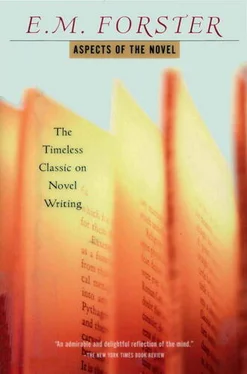And now briefly to illustrate the mystery element in the plot: the formula of "The queen died, it was afterwards discovered through grief." I will take an example, not from Dickens (though Great Expectations provides a fine one), nor from Conan Doyle (whom my priggishness prevents me from enjoying), but again from Meredith: an example of a concealed emotion from the admirable plot of The Egoist: it occurs in the character of Laetitia Dale.
We are told, at first, all that passes in Laetitia's mind. Sir Willoughby has twice jilted her, she is sad, resigned. Then, for dramatic reasons, her mind is hidden from us, it develops naturally enough, but does not re-emerge until the great midnight scene where he asks her to marry him because he is not sure about Clara, and this time, a changed woman, Laetitia says "No." Meredith has concealed the change. It would have spoiled his high comedy if we had been kept in touch with it throughout. Sir Willoughby has to have a series of crashes, to catch at this and that, and find everything rickety. We should not enjoy the fun, in fact it would be boorish, if we saw the author preparing the booby traps beforehand, so Laetitia's apathy has been hidden from us. This is one of the countless examples in which either plot or character has to suffer, and Meredith with his unerring good sense here lets the plot triumph.
As an example of mistaken triumph, I think of a slip—it is no more than a slip—which Charlotte Brontë makes in Villette. She allows Lucy Snowe to conceal from the reader her discovery that Dr. John is the same as her old playmate Graham. When it comes out, we do get a good plot thrill, but too much at the expense of Lucy's character. She has seemed, up to then, the spirit of integrity, and has, as it were, laid herself under a moral obligation to narrate all that she knows. That she stoops to suppress is a little distressing, though the incident is too trivial to do her any permanent harm.
Sometimes a plot triumphs too completely. The characters have to suspend their natures at every turn, or else are so swept away by the course of Fate that our sense of their reality is weakened. We shall find instances of this in a writer who is far greater than Meredith, and yet less successful as a novelist— Thomas Hardy. Hardy seems to me essentially a poet, who conceives of his novels from an enormous height. They are to be tragedies or tragi-comedies, they are to give out the sound of hammer-strokes as they proceed; in other words Hardy arranges events with emphasis on causality, the ground plan is a plot, and the characters are ordered to acquiesce in its requirements. Except in the person of Tess (who conveys the feeling that she is greater than destiny) this aspect of his work is unsatisfactory. His characters are involved in various snares, they are finally bound hand and foot, there is ceaseless emphasis on fate, and yet, for all the sacrifices made to it, we never see the action as a living thing as we see it in Antigone or Berenice or The Cherry Orchard. The fate above us, not the fate working through us—that is what is eminent and memorable in the Wessex novels. Egdon Heath before Eustacia Vye has set foot upon it. The woods without the Woodlanders. The downs above Budmouth Regis with the royal princesses, still asleep, driving across them through the dawn. Hardy's success in The Dynasts (where he uses another medium) is complete, there the hammer-strokes are heard, cause and effect enchain the characters despite their struggles, complete contact between the actors and the plot is established. But in the novels, though the same superb and terrible machine works, it never catches humanity in its teeth; there is some vital problem that has not been answered, or even posed, in the misfortunes of Jude the Obscure. In other words the characters have been required to contribute too much to the plot; except in their rustic humours, their vitality has been impoverished, they have gone dry and thin. This, as far as I can make out, is the flaw running through Hardy's novels: he has emphasized causality more strongly than his medium permits. As a poet and prophet and visualizer George Meredith is nothing by his side—just a suburban roarer—but Meredith did know what the novel could stand, where the plot could dun the characters for a contribution, where it must let them function as they liked. And the moral—well, I see no moral, because the work of Hardy is my home and that of Meredith cannot be: still the moral from the point of these lectures is again unfavourable to Aristotle. In the novel, all human happiness and misery does not take the form of action, it seeks means of expression other than through the plot, it must not be rigidly canalized.
In the losing battle that the plot rights with the characters, it often takes a cowardly revenge. Nearly all novels are feeble at the end. This is because the plot requires to be wound up. Why is this necessary? Why is there not a convention which allows a novelist to stop as soon as he feels muddled or bored? Alas, he has to round things off, and usually the characters go dead while he is at work, and our final impression of them is through deadness. The Vicar of Wakefield is in this way a typical novel, so clever and fresh in the first half, up to the painting of the family group with Mrs. Primrose as Venus, and then so wooden and imbecile. Incidents and people that occurred at first for their own sake now have to contribute to the dénouement. In the end even the author feels he is being a little foolish. "Nor can I go on," he says, "without a reflection on those accidental meetings which, though they happen every day, seldom excite our surprise but upon some extraordinary occasion." Goldsmith is of course a lightweight, but most novels do fail here—there is this disastrous standstill while logic takes over the command from flesh and blood. If it was not for death and marriage I do not know how the average novelist would conclude. Death and marriage are almost his only connection between his characters and his plot, and the reader is more ready to meet him here, and take a bookish view of them, provided they occur later on in the book: the writer, poor fellow, must be allowed to finish up somehow, he has his living to get like anyone else, so no wonder that nothing is heard but hammering and screwing.
This—as far as one can generalize—is the inherent defect of novels: they go off at the end: and there are two explanations of it: firstly, failure of pep, which threatens the novelist like all workers: and secondly, the difficulty which we have been discussing. The characters have been getting out of hand, laying foundations and declining to build on them afterwards, and now the novelist has to labour personally, in order that the job may be done to time. He pretends that the characters are acting for him. He keeps mentioning their names and using inverted commas. But the characters are gone or dead.
The plot, then, is the novel in its logical intellectual aspect: it requires mystery, but the mysteries are solved later on: the reader may be moving about in worlds unrealized, but the novelist has no misgivings. He is competent, poised above his work, throwing a beam of light here, popping on a cap of invisibility there, and (qua plot-maker) continually negotiating with himself qua character-monger as to the best effect to be produced. He plans his book beforehand: or anyhow he stands above it, his interest in cause and effect give him an air of predetermination.
"And what is its subject?" asked Sophroniska.
"There is none," said Edouard sharply. "My novel has no subject. No doubt that sounds foolish. Let us say, if you prefer, that it will not have 'a' subject. .. . 'A slice of life,' the naturalistic school used to say. The mistake that school made was always to cut its slice in the same direction, always lengthwise, in the direction of time. Why not cut it up and down? Or across? As for me, I don't want to cut it at all. You see what I mean. I want to put everything into my novel and not snip off my material either here or there. I have been working for a year, and there is nothing I haven't put in: all I see, all I know, all I can learn from other people's lives and my own."
Читать дальше












